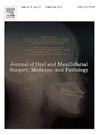Alternation of salivary microbiome and Lautropia dominancy after allogenic hematopoietic stem cell transplantation
IF 0.4
Q4 DENTISTRY, ORAL SURGERY & MEDICINE
Journal of Oral and Maxillofacial Surgery Medicine and Pathology
Pub Date : 2025-05-02
DOI:10.1016/j.ajoms.2025.05.001
引用次数: 0
Abstract
Objective
In a patient with hematological malignancy, oral microbiome is disturbed during chemotherapy including hematopoietic stem cell transplantation (HSCT). A critical role of salivary microbiota has not been fully investigated.
Methods
We collected saliva of 6 HSCT recipients before and after (around 30 day) transplantation, and characterized patterns of oral microbiota. We set up a healthy control cohort (N = 6) as a normal reference. A two-step PCR protocol was used to amplify a 16S rDNA in the V3-V4 region. Sequencing of the amplicons was performed on an Illumina MiSeq (Illumina). A significance of alpha and beta diversity of microbiota, and taxonomic composition were investigated.
Results
The patients’ characteristics were median age 43 years old (range 39–58) and 4 female patients. The diversity of microorganisms in saliva were significantly decreased after HSCT. Shannon index (t-test, P = 0.03) and Simpson index (P = 0.06) were significantly lower in recipients after HSCT comparing to before HSCT. In recipients experienced severe (>grade 2) oral mucositis, alpha index was less diverse compared to recipients with mild or moderate oral mucositis, and in whose saliva genus Lautropia were predominant after HSCT. A common observation of salivary microbiota after HSCT were significant increase of phylum Actinomycetacea and genus Actinomyces. Genus Neisseria was significantly decreased after HSCT.
Conclusions
We observed substantial decreases in the number and diversity of salivary microbiota through HSCT in recipient with hematological malignancy. Lautropia is newly found microorganism, which is possible to linked to mitigation of severe oral mucositis.
同种异体造血干细胞移植后唾液微生物群和Lautropia优势的变化
目的探讨恶性血液病患者在包括造血干细胞移植(HSCT)在内的化疗期间口腔微生物群的变化。唾液微生物群的关键作用尚未得到充分研究。方法收集6例HSCT受者移植前后(约30 天)的唾液,并对口腔微生物群进行特征分析。我们建立了一个健康对照队列(N = 6)作为正常参考。采用两步PCR扩增法在V3-V4区扩增16S rDNA。扩增子的测序在Illumina MiSeq (Illumina)上进行。研究了微生物群α和β多样性的意义及其分类组成。结果患者中位年龄43岁(39 ~ 58岁),女性4例。HSCT后唾液中微生物的多样性显著降低。移植后受者Shannon指数(t检验,P = 0.03)和Simpson指数(P = 0.06)较移植前显著降低。在重度(2级)口腔黏膜炎的受者中,与轻度或中度口腔黏膜炎的受者相比,α指数的多样性较小,在HSCT后,其唾液以Lautropia属为主。HSCT后唾液微生物群的常见观察是放线菌科和放线菌属的显著增加。造血干细胞移植后奈瑟菌属明显减少。结论:通过造血干细胞移植,我们观察到恶性血液病患者唾液微生物群的数量和多样性明显减少。Lautropia是一种新发现的微生物,它可能与减轻严重的口腔黏膜炎有关。
本文章由计算机程序翻译,如有差异,请以英文原文为准。
求助全文
约1分钟内获得全文
求助全文
来源期刊

Journal of Oral and Maxillofacial Surgery Medicine and Pathology
DENTISTRY, ORAL SURGERY & MEDICINE-
CiteScore
0.80
自引率
0.00%
发文量
129
审稿时长
83 days
 求助内容:
求助内容: 应助结果提醒方式:
应助结果提醒方式:


